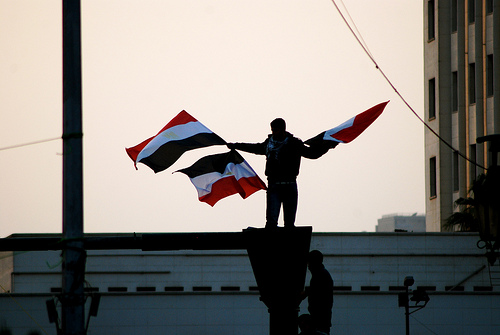
With the ouster of President Mohamed Morsi after one year in office, Egyptians are once again rewriting history. With economic woes compounded by political uncertainty, Egypt has witnessed in the past year an increase in inflation, unemployment and public debt, coupled together with a highly volatile capital market. On the external level, the exchange rate was and still is under significant pressure as resources are drying up and demand for food and energy products are on the rise.
Common sense imposes the need to be aware of the triggers for such a poor economic performance, as well as the need to identify potential ways to escape the spiral of an economic downturn. The main reason for Egypt’s poor economic performance can be attributed to incompetent management. Egypt’s economic recovery, as set by the Muslim Brotherhood-led government, was anchored for the past two years on a loan from the International Monetary Fund (IMF). The loan, however, would (and still will) only add to Egypt’s pains rather then allow for economic growth. The government’s economic strategy consisted of buying time, implementing political changes, many of which aimed only to Brotherhoodize the state and ensure control over political and economic activity, in the absence of transparency and fairness. Ill political will towards the Brotherhood, together with missteps in attempting to blindly implement costly fiscal reforms was a significant catalyst that paved the way for the people to take to the streets on June 30. Morsi’s government did not have enough popular support, with his poll ratings on a constant downward turn since his election, to risk implementing highly unpopular economic reforms that would have been necessary to secure the loan.
Rather than look back, it is now the time to look forward at the daunting challenge facing the yet-to-be-formed cabinet that needs to tackle the ecoomic crisis head on. There is no better place to begin than with global markets and investors considering the Egyptian market as an opportunity, even during its most vulnerable time. The new government’s economic policy should consider geographic and economic diversity and operate on a multi-level scale when it comes to targeting and supporting firms to ensure new jobs will be equitably offered to Egyptian citizens. This is especially necessary in deprived areas that have long been waiting to positively contribute to Egypt’s growth and development.
Egypt should capitalize on the immediate market response witnessed on July 3. The cost of insuring Egypt’s debt dropped significantly, with Egypt’s CDS falling 80 basis points. This indicates a drop in the riskiness of investing in the Egyptian economy. Additionally, the stock market gained strong momentum and the Gulf States promised financial and investment support.
Egypt’s recovery, while challenging but attainable, needs smart and swift action to address the fiscal and external imbalances. Fiscally, the budget needs to be restructured and presented transparently, in order to provide quality public services, and meet the aspirations of Egypt’s youth. Accordingly, domestic debt needs to be restructured. The first step is to galvanize potential support from Gulf States (Saudi Arabia, UAE, Kuwait and Qatar) to create a massive investment fund directed at infrastructure projects addressing the needs of the deprived governorates in Egypt. The government can potentially partner in these projects, providing land, and offering to swap domestic debt owed to financial institutions with equity stakes in these infrastructure projects. The list of projects should be driven by the significant demand for basic services in these densely populated areas including water, sanitation, electricity, transport, education and health.
Egypt should also focus efforts on reducing pressure on external accounts. The current account balances should recover by boosting tourism. With the hope that security is restored, Egypt should immediately promote its tourism sector, initially in the Arab region. Security is very much needed to achieve sustainable economic recovery, but it will certainly be an uphill climb. Achieving this will require several key steps: (i) initiate a subjective and inclusive national and economic dialogue that includes all political and ideological groups and parties to ensure that every Egyptian, irrespective of ideology, will be represented and will peacefully contribute to Egypt’s political future, (ii) The Egyptian police must truly return to their role of securing the nation. An interesting and unexpected phenomena was witnessed at the anti-Morsi rallies, and in the streets following his ouster, in which the people have been very welcoming of the police, in stark contrast with the anger directed at them during the anti-Mubarak protests in January 2011. Capitalizing on that good will, while the government takes serious steps towards security sector reform is the first step in seeing the security void filled. (iii) Temporarily maintain the army’s presence, solely in a security capacity, to aid with security during the transition, (iv) and finally convey to the international community that it was the will of millions of free Egyptians to conduct early presidential elections due to the failure of Morsi and his government to lead a fair and democratic political and economic transition.
This road map is necessary to restore economic momentum, boost foreign exchange and domestic liquidity in productive economic sectors and also create immediate demand on jobs in related sectors, bringing relief to the job market.
The immediate action on these fronts (fiscal sector and current account) will provide a strong incentive for rating agencies to revisit Egypt’s sovereign rating, which is very much needed in order to welcome the private investments necessary for escaping the current economic stagnation.
Ahmed Rostom is currently in the final stages of his Ph.D. in Economics at George Washington University at Washington D.C. in fields of Quantitative Economics and International Trade and finance. He is a Financial Sector Specialist at the World Bank’s East Asia and Pacific: Finance and Private Sector Development Department (EASFP).
Photo: Rowan al-Shimi
Image: Tahrir%20Flags.jpg
